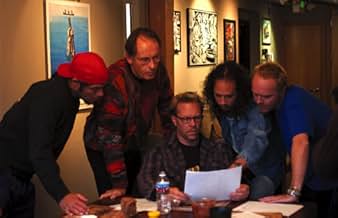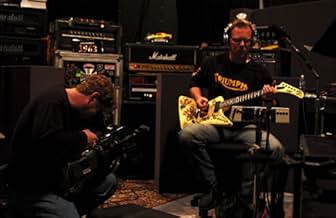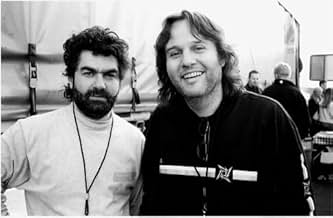The iconic metal band struggles for two years to create their album St. Anger, dealing with alcoholism, the loss of their bass player, and the challenge of working with a psychotherapist.The iconic metal band struggles for two years to create their album St. Anger, dealing with alcoholism, the loss of their bass player, and the challenge of working with a psychotherapist.The iconic metal band struggles for two years to create their album St. Anger, dealing with alcoholism, the loss of their bass player, and the challenge of working with a psychotherapist.
- Awards
- 6 wins & 4 nominations total
Cliff Burton
- Self
- (archive footage)
Steffan Chirazi
- Self
- (as Stefan Chirazi)
Featured reviews
They mention, in the documentary, that maybe the film won't make money. It didn't. About a month after release, it's relegated to single late-night showings, and hasn't even earned one million dollars, nationwide, according to boxofficemojo. That's sad.
The film starts out unintentionally funny. They bring in the overpaid shrink who starts blathering on to the extent you expect Hetfield to stand up and tell him to get gone. But, no, Hetfield actually has an epiphany, thanks to 'Dr. Phil'. It's only at the end, if one sits through this thing, that you see 'Dr. Phil'. thinking of selling the homestead and moving to Bev-r-ley with that $40K a month paycheck (it's more than a lot a lawyers get), when Hetfield and Ulrich sort of cuss him out, tell him the gravy train is slowing down, and Hetfield dismissively leaves saying, Ah, let's play some music. But he still thanks the 'doc' later on. The whole thing is just sad to see. Even so, however comical his epiphany, getting off addiction is still very worthwhile. A shame it couldn't have been a little less embarrassing for Jim.
As good a guitarist a Kirk may be, this film makes him out to be not merely 'egoless', because he's clearly not, but practically effeminate. He seems more himself on his ranch. And he falls back into 'the wimp' role when he's with the band. Maybe if he just wore boots and a white Stetson he'd remember who he is a little better. I don't know.
Lars seems like some squirrely brat, most of the time. His father tells him not to settle. But Dad's in there bopping his head up and down to some truly awful tunes. The 'St. Anger' album was maybe the band's worst. But everyone was playing by the old rules, the old template, and thought there would be big money in this.
That's what they tell Trujillo, who actually had some life to his playing - for what one thinks of brain-dead Ozzy, he sure has picked his sidemen well. They give him the million up front. I wonder if he ever saw much more beyond that? They should have cashed him out for more than that! He harked back to the energy of Mustaine and Hetfield. Even Mustaine has the 'wimp factor' on his side, in this film, nowadays.
Did Metallica have to be toasted to play and compose like Metallica? Did they have to be 'monsters' to write Orion, or Master of Puppets? I don't agree. Or is that to argue that Trujillo is completely zonked in this film? I don't see that. I think the anger is real. I think the anger, the pettiness, particularly of Ulrich, is real in this film. I don't think it's put on. But the difference is that the style of metal is limited. And they don't want to try variations on the old themes, which is really the only way they'd maintain their success. They can't bring themselves to do that. And they don't want to become a folk, or pop band - or a jazz band.
So they play around in the Presidio, and goof in the studio, and have the greedy yes men saying that a least a few songs are outstanding (none were). But they want to try something new. And they've got nothing. They look like amateurs, not the band that released Nothing Else Matters, and so many others.
If they can't go back to the drawing board, if they just can't bring themselves to do that, or if there is just no longer any inspiration or nothing more to steal, then perhaps with a Trujillo they could openly recapture the first Garage Days effort where they cover 'Dope'head and Sabbath and others. They played Sabra Cadabra as well as Rhoades or Zakk. It was a great cover of that song. Some of the other covers were outstanding, even the Skynyrd stuff.
If they can't build on Puppets or Nothing Else or the rest, then maybe they could just re-establish themselves exclusively as a top cover band and cover Alice Cooper (as with the Humanary Stew album, arguably one of the best cover/tribute albums ever made). There's so much they could cover, so many bands and songs that may never otherwise really 'break through'. And then they wouldn't be so bored out of their minds that they might release another film such as this, even in the hope it might earn so much a cool million (after expensese, etc).
They'll be missed.
The film starts out unintentionally funny. They bring in the overpaid shrink who starts blathering on to the extent you expect Hetfield to stand up and tell him to get gone. But, no, Hetfield actually has an epiphany, thanks to 'Dr. Phil'. It's only at the end, if one sits through this thing, that you see 'Dr. Phil'. thinking of selling the homestead and moving to Bev-r-ley with that $40K a month paycheck (it's more than a lot a lawyers get), when Hetfield and Ulrich sort of cuss him out, tell him the gravy train is slowing down, and Hetfield dismissively leaves saying, Ah, let's play some music. But he still thanks the 'doc' later on. The whole thing is just sad to see. Even so, however comical his epiphany, getting off addiction is still very worthwhile. A shame it couldn't have been a little less embarrassing for Jim.
As good a guitarist a Kirk may be, this film makes him out to be not merely 'egoless', because he's clearly not, but practically effeminate. He seems more himself on his ranch. And he falls back into 'the wimp' role when he's with the band. Maybe if he just wore boots and a white Stetson he'd remember who he is a little better. I don't know.
Lars seems like some squirrely brat, most of the time. His father tells him not to settle. But Dad's in there bopping his head up and down to some truly awful tunes. The 'St. Anger' album was maybe the band's worst. But everyone was playing by the old rules, the old template, and thought there would be big money in this.
That's what they tell Trujillo, who actually had some life to his playing - for what one thinks of brain-dead Ozzy, he sure has picked his sidemen well. They give him the million up front. I wonder if he ever saw much more beyond that? They should have cashed him out for more than that! He harked back to the energy of Mustaine and Hetfield. Even Mustaine has the 'wimp factor' on his side, in this film, nowadays.
Did Metallica have to be toasted to play and compose like Metallica? Did they have to be 'monsters' to write Orion, or Master of Puppets? I don't agree. Or is that to argue that Trujillo is completely zonked in this film? I don't see that. I think the anger is real. I think the anger, the pettiness, particularly of Ulrich, is real in this film. I don't think it's put on. But the difference is that the style of metal is limited. And they don't want to try variations on the old themes, which is really the only way they'd maintain their success. They can't bring themselves to do that. And they don't want to become a folk, or pop band - or a jazz band.
So they play around in the Presidio, and goof in the studio, and have the greedy yes men saying that a least a few songs are outstanding (none were). But they want to try something new. And they've got nothing. They look like amateurs, not the band that released Nothing Else Matters, and so many others.
If they can't go back to the drawing board, if they just can't bring themselves to do that, or if there is just no longer any inspiration or nothing more to steal, then perhaps with a Trujillo they could openly recapture the first Garage Days effort where they cover 'Dope'head and Sabbath and others. They played Sabra Cadabra as well as Rhoades or Zakk. It was a great cover of that song. Some of the other covers were outstanding, even the Skynyrd stuff.
If they can't build on Puppets or Nothing Else or the rest, then maybe they could just re-establish themselves exclusively as a top cover band and cover Alice Cooper (as with the Humanary Stew album, arguably one of the best cover/tribute albums ever made). There's so much they could cover, so many bands and songs that may never otherwise really 'break through'. And then they wouldn't be so bored out of their minds that they might release another film such as this, even in the hope it might earn so much a cool million (after expensese, etc).
They'll be missed.
The debate over whether or not Michael Moore's `Fahrenheit 9/11' should be called a `documentary' won't be heard hovering around Joe Berlinger and Bruce Sinofsky's (`Brother's Keeper,' `Paradise Lost') `Metallica: Some Kind of Monster' because it is a documentary, an accurate rendering of the rock group's long struggle to create its latest album, `St. Anger.' Although sex and drugs play no role in the film and the groupie adulation is almost non present, making even the most out-of touch viewer skeptical, the battle of frontman James Hetfield with alcohol and the group with dysfunction has the feel of authenticity. We are left with a business partnership reviving its product.
By engaging `performance-enhancement coach' Phil Towle for $40,000 a month, Metallica puts its money where its mouth is-a serious effort to preserve the magic of a group that sold 90 million albums, so much a product of delicate personality bonding that the full time therapist had a real challenge to preserve the indefinable chemistry. Beside Hetfield's demons, drummer Lars Ulrich's Napster battle takes energy from the group, so Towle is probably a small investment in its survival. If heavy metal is not your thing, seeing this group psychodrama would be worth the admission.
Not seeming to fit the overall clinical activity of the film is a scene of Ulrich selling his art collection. Critic Ed Gonzalez gives an insightful explanation:
`There's a moment in the film where Berlinger and Sinofsky force a fascinating correlation between the paintings that hang in Ulrich's home and the music the band makes, calling attention to the relationship between art and the spectator and the way that art is consumed. This scene has absolutely nothing to do with the psych sessions between Metallica and Towle, and it's a great one.'
This kind of organic unity makes it a documentary of artful proportions. I still prefer classical and folk music, but I have to admit to a new interest in a musical genre I can share with my musician grandson Cody.
By engaging `performance-enhancement coach' Phil Towle for $40,000 a month, Metallica puts its money where its mouth is-a serious effort to preserve the magic of a group that sold 90 million albums, so much a product of delicate personality bonding that the full time therapist had a real challenge to preserve the indefinable chemistry. Beside Hetfield's demons, drummer Lars Ulrich's Napster battle takes energy from the group, so Towle is probably a small investment in its survival. If heavy metal is not your thing, seeing this group psychodrama would be worth the admission.
Not seeming to fit the overall clinical activity of the film is a scene of Ulrich selling his art collection. Critic Ed Gonzalez gives an insightful explanation:
`There's a moment in the film where Berlinger and Sinofsky force a fascinating correlation between the paintings that hang in Ulrich's home and the music the band makes, calling attention to the relationship between art and the spectator and the way that art is consumed. This scene has absolutely nothing to do with the psych sessions between Metallica and Towle, and it's a great one.'
This kind of organic unity makes it a documentary of artful proportions. I still prefer classical and folk music, but I have to admit to a new interest in a musical genre I can share with my musician grandson Cody.
First of all, let me say I'm a Metallica fan so this review is unevitably biased. But then again, what review isn't? We all know Metallica are great business men, so the first question that arises is: is this movie a marketing tool? Even though I'm sure the movie will be a commercial success, my answer to the question is no.
Metallica's record company wanted the movie to accompany Metallica's 2003 release St. Anger as a weekly series of 30 minute reality TV to get the word out about the album. Metallica not only rejected that idea, but even decided to buy out the record company and release this a year later as a movie instead. We can only thank them for it.
This movie is certainly not a commercial for Metallica. We get to see the ugly side of Metallica. And it's ugly alright. We see Lars calling James a dick, shouting 'fuck' right in his face and getting drunk while selling his millions of dollars art collection. We see James yelling at Lars, slamming the door, checking in for rehab and after that demanding everyone to only work from 12 to 4. We see Kirk being a sissy the entire movie.
The title of the movie refers to James; he explains how Metallica has been a beast to him over the years. But Metallica has undoubtedly been a beast to others as well. Dave Mustaine is one of the most successful musicians in heavy metal with his band Megadeth, but apparently is still haunted by him being fired from Metallica. Nevertheless, the movie is ultimately about James' 'coming of age', changing from an angry alcoholic to a man who has managed to balance his personal life with the life in Metallica.
I have one beef with the movie. Around the end Lars says Metallica have proved that it's possible to make an angry record through positive energy. While I believe him when he says that, I do have to say I hardly saw any of that energy in the movie. In fact, it's a small miracle they managed to finish the album at all.
Even though not everyone is a fan of Metallica, I can recommend everyone to see this movie. See, this movie is not about the music. It's about people. People who struggle with themselves, with each other and with the outside world. It's also a unique look inside the workings (and non-workings) of a world class band and into the lifestyles of the rich and famous. This documentary is a landmark that upstages the album which creation it was originally supposed to document.
Metallica's record company wanted the movie to accompany Metallica's 2003 release St. Anger as a weekly series of 30 minute reality TV to get the word out about the album. Metallica not only rejected that idea, but even decided to buy out the record company and release this a year later as a movie instead. We can only thank them for it.
This movie is certainly not a commercial for Metallica. We get to see the ugly side of Metallica. And it's ugly alright. We see Lars calling James a dick, shouting 'fuck' right in his face and getting drunk while selling his millions of dollars art collection. We see James yelling at Lars, slamming the door, checking in for rehab and after that demanding everyone to only work from 12 to 4. We see Kirk being a sissy the entire movie.
The title of the movie refers to James; he explains how Metallica has been a beast to him over the years. But Metallica has undoubtedly been a beast to others as well. Dave Mustaine is one of the most successful musicians in heavy metal with his band Megadeth, but apparently is still haunted by him being fired from Metallica. Nevertheless, the movie is ultimately about James' 'coming of age', changing from an angry alcoholic to a man who has managed to balance his personal life with the life in Metallica.
I have one beef with the movie. Around the end Lars says Metallica have proved that it's possible to make an angry record through positive energy. While I believe him when he says that, I do have to say I hardly saw any of that energy in the movie. In fact, it's a small miracle they managed to finish the album at all.
Even though not everyone is a fan of Metallica, I can recommend everyone to see this movie. See, this movie is not about the music. It's about people. People who struggle with themselves, with each other and with the outside world. It's also a unique look inside the workings (and non-workings) of a world class band and into the lifestyles of the rich and famous. This documentary is a landmark that upstages the album which creation it was originally supposed to document.
I am a huge fan of early Metallica. They lost me, though, on the Metallica album (the black album, the first sign that they were turning into Spinal Tap). While this documentary is great film, I have to say that it just makes clear that Lars and James are utterly devoid of humor when it comes to themselves. At the film festival screening the theatre was filled with laughter as they revealed themselves to be petulant children who have a long way to go to reach maturity. Poor Kirk and the new guy, Rob Trujillo. There were only two times when Lars spoke really honestly in a way that didn't seem manipulative, and James never gave up anything real except when he was with his kids. The $40,000 a month counselor (he is not a trained psychiatrist or psychologist) was right out of Spinal Tap. FYI- the biggest cheers erupted after every Jason Newsted interview because he is just straight up, real, and honest. I wish him a lot of success because he seems to truly be all about playing music. Believe me, I applaud Metallica for being willing to let people see this truly great film, but as for Lars and James, lighten up for crying out loud. Therapy isn't only about expressing your feelings and expecting everyone to pat you on the back, it's also about learning to admit when you're wrong or being a jerk and laughing at yourself.
I don't know how they do it, but although Metallica lost me as a fan many years ago (sometime in the mid 90's), they still manage to release DVDs that are totally intriguing. "Cunning Stunts" was an intense concert movie that let you feel the energy of a Metallica gig, where even songs from "Load" and "ReLoad" sounded good. Now, "Some Kind Of Monster" is something even more special. Really special. As far as rock films go, this one is right up there with "The Kids Are Alright" and "The Last Waltz".
Joe Berlinger & Bruce Sinofsky are always there in time to catch the most important facial expressions, quotes and actions. The movie almost runs too perfectly, as if the whole thing had been scripted. The emotions of the band members and those around them seem so genuine, though, that it's hard to have any doubts about the movie's authenticity. It must have been a terrible stressing for the band - especially in a situation like this - to have cameras around them all the time. Throughout the whole movie you feel like you're in the room with one of the biggest rock bands on the planet and the cool thing is, that you really get a look behind the image, behind that Rock 'N' Roll dream. What you find are three guys that are just as unsure about themselves, their friendship and their career as everybody else is. Hetfield, Hammett and Ulrich try to be honest throughout the whole documentary and everybody comes across as a more or less normal person (Ulrich and his ego are more than just a bit annoying, though, and it's sad to see that the band still doesn't seem to have the tiniest bit of respect for their former bandmate Jason Newstedt, who had to put up with a lot of crap for almost 15 years). A whiny appearance by former band member/Megadeth frontman Dave Mustaine sticks out as the most moving/funniest moment. It really must suck to feel like he does, regretting everyday that you've been kicked out of one of the biggest bands on earth. Respect for such an honest statement in front of the cameras, though.
"Some Kind Of Monster" entertains for more than 120 minutes (and there's more on the DVD) without ever getting boring. The weird thing about this documentary is, that it's never about the music, but more about the process of a band recording itself. Whoever said that this one is a must see for Metallica fans, documentary fans and anyone in between got it right. It's more than your usual VH1 special. This one REALLY takes a look "behind the music" and a very exciting one at that.
Joe Berlinger & Bruce Sinofsky are always there in time to catch the most important facial expressions, quotes and actions. The movie almost runs too perfectly, as if the whole thing had been scripted. The emotions of the band members and those around them seem so genuine, though, that it's hard to have any doubts about the movie's authenticity. It must have been a terrible stressing for the band - especially in a situation like this - to have cameras around them all the time. Throughout the whole movie you feel like you're in the room with one of the biggest rock bands on the planet and the cool thing is, that you really get a look behind the image, behind that Rock 'N' Roll dream. What you find are three guys that are just as unsure about themselves, their friendship and their career as everybody else is. Hetfield, Hammett and Ulrich try to be honest throughout the whole documentary and everybody comes across as a more or less normal person (Ulrich and his ego are more than just a bit annoying, though, and it's sad to see that the band still doesn't seem to have the tiniest bit of respect for their former bandmate Jason Newstedt, who had to put up with a lot of crap for almost 15 years). A whiny appearance by former band member/Megadeth frontman Dave Mustaine sticks out as the most moving/funniest moment. It really must suck to feel like he does, regretting everyday that you've been kicked out of one of the biggest bands on earth. Respect for such an honest statement in front of the cameras, though.
"Some Kind Of Monster" entertains for more than 120 minutes (and there's more on the DVD) without ever getting boring. The weird thing about this documentary is, that it's never about the music, but more about the process of a band recording itself. Whoever said that this one is a must see for Metallica fans, documentary fans and anyone in between got it right. It's more than your usual VH1 special. This one REALLY takes a look "behind the music" and a very exciting one at that.
Did you know
- TriviaAll the footage for the film was comprised of 1600 hours of footage and was cut down to 2 Hours and 20 minutes.
- Quotes
[Metallica is asked to record a radio promo]
Lars Ulrich: Hey it's Lars from Metallica. I'm about to stick 50 grand up your ass...
James Hetfield: ...One dollar at a time.
- ConnectionsEdited from MTV News (1989)
- SoundtracksFrantic
Performed by Metallica
Written by James Hetfield (as Hetfield), Lars Ulrich (as Ulrich), Kirk Hammett (as Hammett),
Bob Rock (as Rock)
Courtesy of Elektra Entertainment Group
By Arrangement with Warner Strategic Marketing
Published by Creeping Death Music (ASCAP) and EMI Blackwood Music (Canada) Ltd./Mahina Hoku Publishing (SOCAN),
© 2003
- How long is Metallica: Some Kind of Monster?Powered by Alexa
Details
- Release date
- Country of origin
- Official site
- Language
- Also known as
- 金屬製品樂團:異種怪獸
- Filming locations
- Production companies
- See more company credits at IMDbPro
Box office
- Gross US & Canada
- $1,222,708
- Opening weekend US & Canada
- $46,359
- Jul 11, 2004
- Gross worldwide
- $1,980,444
- Runtime
- 2h 21m(141 min)
- Color
- Sound mix
- Aspect ratio
- 1.33 : 1
Contribute to this page
Suggest an edit or add missing content




























